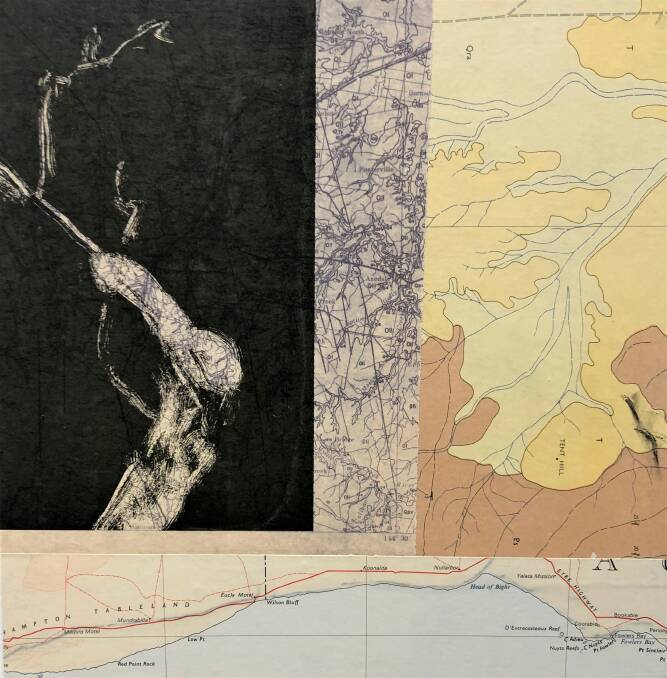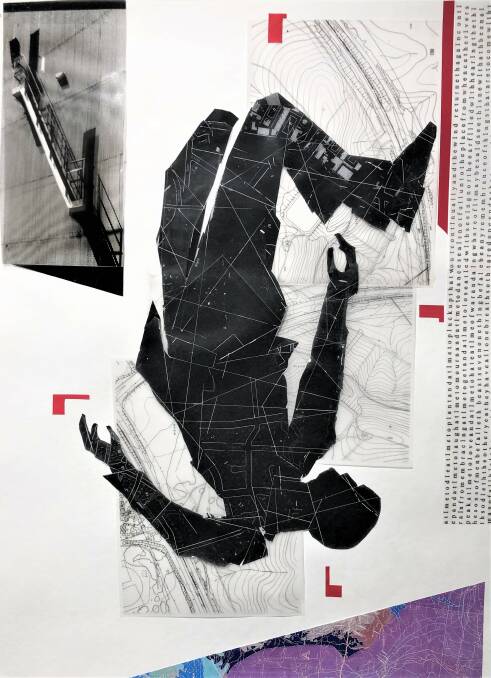
Nicci Haynes, Peter McLean and John Pratt: Fluid Cartographies. Belconnen Arts Centre, Pivot Gallery, 118 Emu Bank, Belconnen. Until May 9, 2021.
Subscribe now for unlimited access.
or signup to continue reading
The great 17th century poet John Donne, fearing that his death was approaching, wrote one of his most famous works, Hymn to God, My God, in My Sickness. In the second stanza he describes his doctors as "cosmographers" and "I their map, who lie flat on this bed" on which they chart the passage of his illness and assume because of its gravity that there will be no return journey.
Although all three artists are primarily printmakers, their attitudes to maps differ considerably.
The interaction between people and maps is an interesting one and traditionally was a far more personalised experience than simply confronting a GPS where a mechanical voice guides you to your destination. The new exhibition at Belco Arts, Fluid Cartographies, explores the ways in which three Canberra-based artists - Nicci Haynes, Peter McLean and John Pratt - interact with and find inspiration in map imagery.
Although all three artists are primarily printmakers, their attitudes to maps differ considerably. Haynes for many years has been moving in the realm of performance art and in her two short video pieces at the exhibition, Force field and Points in space, explores the charting of the movement of the body in space as a form of kinetic map. Despite the interesting plotting of movement, I found the link with maps difficult to follow.
McLean embraced the challenge of working with maps and to some extent views them as an intersection between the imagined chartered world and the natural world itself. There is a great sense of energy, humour and physicality that pervades his 27 pieces at the exhibition as he argues through his work that cartography is a layered experience with numerous levels of reality.
About his Seeking Country collage he observes, "Much of my figurative work is about the feeling of seeking a more deeply felt connection to country, and a feeling of loss for the nature that has been so profoundly altered and the severing of cultural connections to land that have come about from modern industrial culture."

In McLean's work, maps name and claim country for the new colonial and industrial powers and the role of the artist is to draw attention to this and to subvert the process. The empty spaces on maps mark the places where the artist's imagination can enter and intervene to reveal that which has been concealed as in such wonderful pieces as Barren, Anticline and Still Standing, all made in 2021.
Pratt has been a key teacher of printmaking in Canberra for many years and since he recently retired in his art there has been a sense of joy, energy and inventiveness. His small running, tumbling and falling figures in the Passage and Compass series at this exhibition form a playful relationship with the maps that surround them.
Pratt observes about this series of work, "These collages are a playful exploration of the cartographic aesthetic - its shapes, colours, and texture and the various ways in which these elements might resonate with certain aspects of human experience." Within this overall playfulness, Pratt's fleeing figures also seem to hint at a discomfort with the prevailing state of the world and suggests the "confidence" that is proclaimed by a map - as if all is known, recorded and sorted - may only be a veneer under which reigns a world of chaos.
Fluid Cartographies is a challenging exhibition that questions the sense of order and security that we experience while viewing a map. Perhaps as Donne suggested long ago, each of us is a map and all maps are ephemeral despite our best endeavours to give them authority and permanence.

